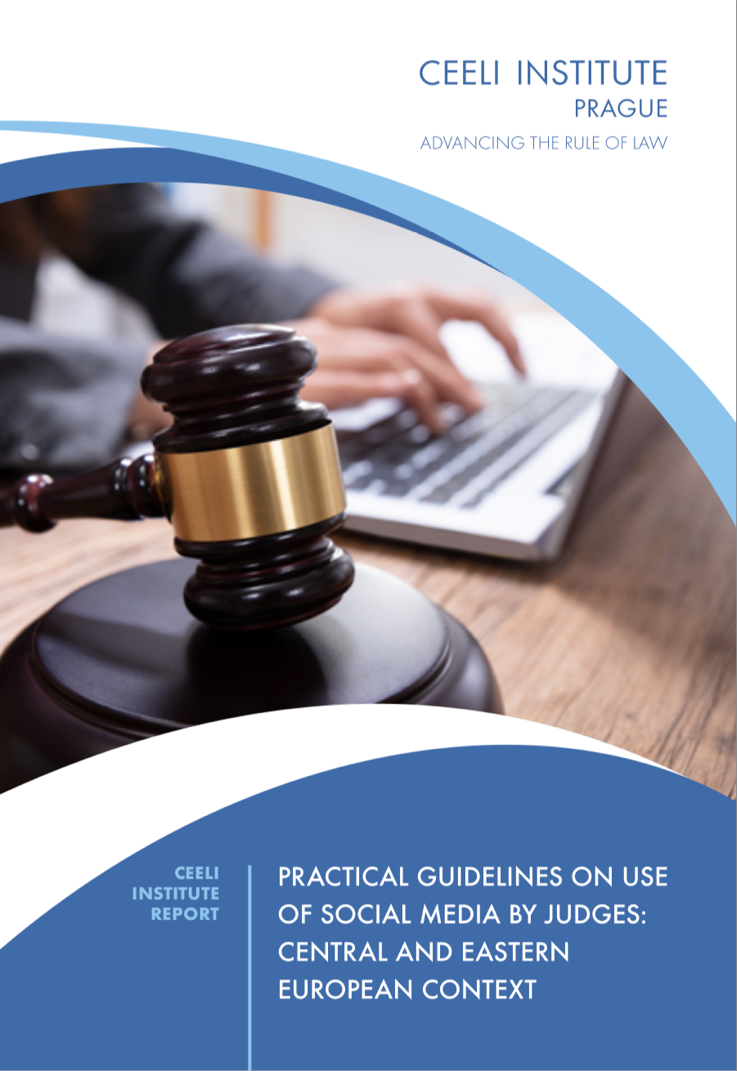Launching of Practical Guidelines on use of Social Media by Judges

December 2019 CEELI Institute Prague, Czech Republic

Over the past year, the CEELI Institute has produced and published a number of substantive tools, guidelines, and monographs on topics of current relevance to judges, lawyers and human rights defenders across Europe and beyond. Among them, CEELI is delighted to introduce the most recent publication, Practical Guidelines on Use of Social Media by Judges: Central and Eastern European Context. The Guidelines recognize that participation on social media platforms is an intrinsic part of modern life; they also recognize that for many judges, participation on social media actually contributes to their public outreach efforts and their effort to build public interest in and trust of the judiciary.
Since there have been very little specific guidance and very few standards to date regarding these issues, judges often have to come up with their own individual solutions or approaches, which might lead them into situations involving conflicts of interests and ethical dilemmas. The new Guidelines represent several years of work by judges from CEELI’s Network of Central and Eastern European Judges, and summarize research and discussions that Network members have undertaken over the past several years. The goal of the document is to provide judges with a clear overview of the pros and cons of using social media and offer recommendations on how to use it smartly and safely. The document is relevant to any individual judge who is active on social media as well as to anyone responsible for setting national guidelines for judicial conduct. This includes members of judicial councils, court presidents, officials from judicial associations and any other members of the judiciary who need to set regulations on the behaviour of judges on social media. This publication is a testament to the extraordinary commitment of time and effort by the Network judges who participated in this project and who undertook extensive independent research and editing, coming together periodically at the Institute to coordinate and collaborate on their work.

Thanks also to Ksenija Renko,Jupiter Strategic Consultant Ltd. and Marko Rakar, Mrak Ltd, regional public relations and communication experts, to David Sellers, Public Affairs Officer, Administrative office of the US Courts, Barbora Field and Freda Grealy, CEELI Institute Program Managers, and Katherine Sorrell, CEELI Institute Legal Intern (William and Mary Law School) for their valuable contributions in developing these Guidelines. The Institute also wishes to thank the Hon. Judith Macaluso, Janet Katz, and Jane Mahoney for their invaluable assistance in editing this document.

OVERVIEW OF RECOMMENDATIONS
1. Represent the Judiciary Well in ALL Social Media Content
Always maintain a professional tone and maintain an awareness of your role as a judge even if posting in a personal context. Anyone with a career in the judiciary needs to be careful about what they write and what they publish online, whether via email, text, or social media posts, since digital content is so easily and widely accessible and could impact their work in a variety of ways.
2. Never Comment on Pending Cases
In line with the Bangalore Principles comments about court judgments or ongoing cases are particularly sensitive, because they can raise suspicions about the impartiality and objectivity of judges and the judicial system.
3. Do Not Use Social Media to Investigate Parties
Judges must consider only the evidence presented by the parties and any facts properly subject to judicial notice. Judges should not independently investigate case facts by means other than those provided by law.
4. Mind Whom You “Friend” and What or Whom You “Like”
When declaring yourself a friend with someone on social media or liking particular posts, members of the judiciary should take care not to compromise their neutrality. Interaction on social media can create the perception of bias, even if it does not exist.
5. Avoid Political and Commercial Comments
Judges should stay out of political debates and not publicly disclose their political views.
6. Adjust and Monitor Your Online Visibility
Carry out regular review of your online social presence and adjust your privacy settings if necessary.
7. Protect Your Personal Data
Think twice before revealing any personal information. Once you post personal information on Facebook or any other social network, it is highly unlikely that you will be able to keep it private. Such personal data has a permanent presence and can be recovered, circulated, or printed years after being sent or posted online.
8. Educate Your Family and Friends
Talk to your family and friends to ensure they understand the sensitivity of the judicial work you conduct and potential consequences of their actions online if they reveal personal information or photographs that could be linked to your profile.
9. Using Social Media to Educate the Public
Social media platforms can be used as a positive tool to engage and educate the public, promote transparency, advocate, explain the importance of judicial tasks, and provide information about the activities of judicial institutions. Many judges throughout Central and Eastern Europe, and beyond, have successfully used social media to this end.
10. Continue to Educate Yourself about Social Media
Social media is here to stay and judicial training and continuing education on social media use is critical. Among other things, judges must be familiar with the operation of social media as issues related to its use will increasingly be relevant to the cases before them.



